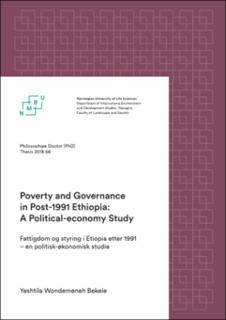| dc.contributor.advisor | Kjosavik, Darley Jose | |
| dc.contributor.advisor | Shanmugaratnam, Nadarajah | |
| dc.contributor.author | Bekele, Yeshtila Wondemeneh | |
| dc.coverage.spatial | Ethiopia | en_US |
| dc.date.accessioned | 2020-12-02T12:57:27Z | |
| dc.date.available | 2020-12-02T12:57:27Z | |
| dc.date.issued | 2018 | |
| dc.identifier.isbn | 978-82-575-1525-6 | |
| dc.identifier.issn | 1894-6402 | |
| dc.identifier.uri | https://hdl.handle.net/11250/2711493 | |
| dc.description.abstract | In the post-1991 period, Ethiopia has committed itself to breaking the vicious cycle of poverty through various poverty reduction strategies. Although there have been remarkable achievements, poverty remains an obstacle to realising sustainable growth and redistributive justice. The existing literature and research findings on the status of poverty in the country indicate by-and-large that poor economic performance has been a root cause of persistent poverty. However, the cause and anatomy of poverty goes beyond purely economic factors.
This study argues that the political-economy order is a structural cause of poverty. It further illustrates that poverty is an outcome of power relations rooted in property rights, particularly land ownership; the ability to be represented and to be able to make decisions; and participation in local institutions. The study employed mixed methodology and analysis by using both qualitative and quantitative approaches; data collection methods included interviews, focus group discussions, a household survey and field observations. The systematic random household survey covered 518 households in three regions (SNNPRS, ANRS, and ONRS). Specific data collection activities were carried out in eight purposefully selected rural Kebeles (Peasant Associations) . | en_US |
| dc.description.abstract | I perioden etter 1991 har Etiopia forsøkt å bryte den onde fattigdomssirkelen ved hjelp av forskjellige fattigdomsbekjempende strategier. Selv om det har skjedd store fremskritt, er fattigdommen fortsatt til hinder for bærekraftig vekst og omfordelt rettferdighet. Eksisterende litteratur og forskning på fattigdom generelt indikerer at dårlig økonomisk prestasjonsevne er årsaken til den vedvarende fattigdommen. Men fattigdommens årsaker og anatomi strekker seg utover økonomiske faktorer.
Denne studien argumenterer for at den politiske økonomiske orden er en strukturell årsak til fattigdom. Videre viser den at fattigdom er et resultat av maktforhold med utspring i eiendomsrettigheter, spesielt til land; mulighet til å være representert og kunne delta i avgjørelser; og deltakelse i lokale institusjoner. Studien benyttet seg av en blandet metodologi og analyse ved å bruke både kvalitative og kvantitative tilnærminger. De spesifikke metodene brukt for å samle data var intervjuer, fokusgruppediskusjoner, husholdningsundersøkelser og feltobservasjoner. Den systematiske and omiserte husholdningsundersøkelsen dekket 518 husholdninger i tre regioner (SNNPRS, ANRS og ONRS). Spesifikk datainnsamling ble utført i åtte utvalgte landsbydistrikter, såkalte Kebeler. | en_US |
| dc.language.iso | eng | en_US |
| dc.publisher | Norwegian University of Life Sciences, Ås | en_US |
| dc.relation.ispartofseries | PhD Thesis;2018:56 | |
| dc.rights | Attribution-NonCommercial-NoDerivatives 4.0 Internasjonal | * |
| dc.rights.uri | http://creativecommons.org/licenses/by-nc-nd/4.0/deed.no | * |
| dc.title | Poverty and governance in post-1991 Ethiopia : a political-economy study | en_US |
| dc.title.alternative | Fattigdom og styring i Etiopia etter 1991 : en politisk-økonomisk studie | en_US |
| dc.type | Doctoral thesis | en_US |
| dc.description.version | publishedVersion | en_US |
| dc.subject.nsi | VDP::Social science: 200 | en_US |

